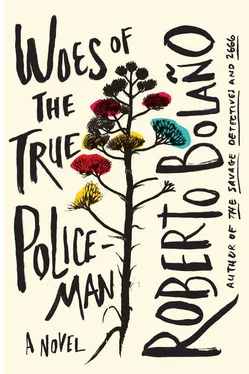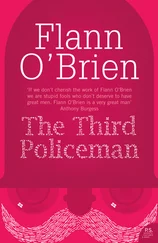“The sacred fir. The common fir. Two shrubs, the guayule and the candelilla. Epazote ( Chenopodium ambrosioides ). The grass called zacatón ( Epicampes macroura ). Giant grass ( Guadua amplexifolia ). And here,” said Guerra, stopping at last, “our national tree, or at least that’s how I think of it, our dear, beloved ahuehuete ( Taxodium mucronatum ).”
Amalfitano gazed at Guerra and the tree and thought wearily but also with emotion that he was back in America. His eyes filled with tears that later he wouldn’t be able to explain to himself. Ten feet from him, his back turned, Professor Guerra trembled.
In his next letter, Padilla talked about Raoul Delorme and the sect known as the barbaric writers, created by Delorme midway through the 1960s. While the future novelists of France were breaking the windows of their high schools or erecting barricades or making love for the first time, Delorme and the nucleus of the soon-to-be barbaric writers were shut up in tiny garrets, concierge quarters, hotel rooms, and the backs of stores and pharmacies, preparing for the coming of a new literature. For them, according to Padilla’s sources, May of ’68 was a period of creative retreat: they kept indoors (eating stockpiled provisions or fasting), talked only among themselves, and — singly and in groups of three — practiced new writing techniques that would astonish the world, attempting to predict the moment when they would burst onto the world scene, a moment that was first erroneously calculated be 1991 but upon further divining adjusted to 2005. The sources Padilla cited were magazines that Amalfitano had never heard of before: Issue 1 of the Evreux Literary Gazette , Issue 0 of the Metz Literary Journal , Issue 2 of the Arras Journal of Night Watchmen , Issue 4 of the Literary and Trade Journal of the Grocers’ Guild of the Poitou . A “foundational elegy” by someone called Xavier Rouberg (“We salute a new literary school”) had been printed twice, in the Literary Gazette and the Literary Journal . The Journal of Night Watchmen included a crime story by Delorme and a poem by Sabrina Martin (“The Inner and Outer Sea”) preceded by an introductory note by Xavier Rouberg that was simply a shorter version of his “foundational elegy.” Featured in the Literary and Trade Journal was the work of six poets (Delorme, Sabrina Martin, Ilse von Kraunitz, M. Poul, Antoine Dubacq, and Antoine Madrid), each represented by a single poem — except Delorme and Dubacq with three and two, respectively — under the collective heading “The Barbaric Poets: When Pastime Becomes Profession.” As if to confirm what amateurs the poets were, their day jobs were indicated in parentheses beneath their names, next to the passport-style photos. Thus the reader learned that Delorme owned a bar, that Von Kraunitz was a nurse’s aide at a Strasbourg hospital, that Sabrina Martin worked cleaning houses in Paris, that M. Poul was a butcher, and that Antoine Madrid and Antoine Dubacq made a living tending newsstands. Regarding Xavier Rouberg, the John the Baptist of the barbarics, Padilla claimed to have done some sleuthing: he was eighty-six, his past was full of lacunae, he had spent time in Indochina, for a while he had been a publisher of pornographic literature, he had communist, fascist, and surrealist sympathies (he was a friend of Dalí, about whom he wrote a trifling little book, Dalí For and Against the World ). Unlike the barbaric writers, Rouberg came from a well-to-do family and had been to university. Everything seemed to indicate that the barbarics were the last project to which Xavier Rouberg attached his hopes. Like almost all Padilla’s letters, this one ended abruptly. No goodbye, no hasta pronto. Amalfitano read it in his faculty cubicle with mounting amusement and trepidation. For a moment he imagined that Padilla was serious, that such a literary group really existed, and — horrors — that Padilla shared or was prepared to embrace its interests. Then he changed his mind, and decided that neither the group nor much less the magazines existed ( Literary and Trade Journal of the Grocers’ Guild of the Poitou !), that it might all be part of The God of Homosexuals . Later, on his way out of class, he gave Padilla’s letter some more thought and became sure of one thing: if Delorme and the barbaric writers were characters in Padilla’s novel, it must be a very bad novel. That night, as he was walking with Castillo and a friend of Castillo’s along what was both the leafiest and the darkest street in Santa Teresa, he tried to call Padilla from a public phone. Castillo and his friend got change for Amalfitano at a taco cart and chipped in all the coins they had in their pockets. But in Barcelona there was no answer. After a while he stopped trying and attempted to convince himself that everything was all right. He got home later than usual. Rosa was awake in her room, watching a movie. He called good night to her through the closed door and went straight to his desk and wrote a letter to Padilla. Dear Joan, he wrote, dear Joan, dear Joan, dear Joan, how I miss you, how happy and how miserable I am, what an incredible life this is, what a mysterious life, we hear so many voices over the course of a day or a life, and the memory of your voice is so lovely. Etc. He ended by saying that he’d really liked the story about Delorme, the barbaric writers, and all those journals, but that as he’d envisioned it (for no good reason, probably), there was nothing in The God of Homosexuals about any French literary school. You have to tell me more about your novel, he said, but also about your health, your financial situation, your moods. In closing, he begged him to keep writing. He didn’t have long to wait, because the next day another letter arrived from Padilla.
As had become customary, Padilla didn’t wait for Amalfitano to answer before he sent another letter. It was as if after putting a letter in the mail, a zeal for accuracy and precision compelled him to immediately send a series of explanations, particulars, and sources intended to shed further light on the missive already dispatched. This time Amalfitano found neatly folded photocopies of the covers of the Literary Gazette , the Literary Journal , the Journal of Night Watchmen , and the Literary and Trade Journal of the Grocers’ Guild . Also: photocopies of the articles cited and of the poems and stories by the barbaric writers, which upon brief perusal struck him as horrible: a blend of Claudel and Maurice Chevalier, crime fiction and first-year creative writing workshop. More interesting were the photographs (appearing in the Literary and Trade Journal , which looked as if it were printed by professionals, unlike the Journal and the Gazette , surely put out by the barbarics themselves, not to mention the Journal of Night Watchmen , mimeographed in the manner of the 1960s and full of crossings-out, smudges, spelling mistakes). There was something magnetic about the faces of Delorme and his gang: first, they were all staring straight at the camera and therefore straight into Amalfitano’s eyes, or the eyes of any reader; second, all of them, without exception, seemed confident and sure of themselves, especially the latter, light-years from self-doubt or a sense of their own absurdity, which — considering that they were French writers — might not have been so surprising, and yet it was, despite everything (let’s not forget that they were amateurs, though maybe it was precisely because they were amateurs, thought Amalfitano, that they were beyond any awkwardness, embarrassment, or whatever, drifting in the limbo of the naïve); third, the age difference wasn’t just striking, it was unsettling: what bond — let alone literary school — could unite Delorme, who was well into his sixties and looked his age, and Antoine Madrid, who surely had yet to turn twenty-two? Confident expressions aside, the faces could be classified either as open (Sabrina Martin, who seemed to be about thirty, and Antoine Madrid, though there was something about him that spoke of the tight player, the man of reserve), or closed (Antoine Dubacq, a bald man with big glasses who must have been in his late forties, and Von Kraunitz, who might just as easily have been forty as sixty), or mysterious (M. Poul, nearly skeletal, spindle-faced, cropped hair, long bony nose, ears flat to the skull, prominent and probably jumpy Adam’s apple, maybe fifty, and Delorme, by all lights the chief, the Breton of this writerly proletariat, as Padilla described him). Without Rouberg’s notes, Amalfitano would have taken them for advanced students — or simply eager students — of a writing workshop in some blue-collar suburban neighborhood. But no: they had been writing for a long time, they met regularly, they had a common writing process, common techniques, a style (undetected by Amalfitano), goals. The information on Rouberg came from Issue 1 of the Literary and Trade Journal of which he seemed to be the editor in chief, though his name didn’t appear on the masthead. It wasn’t hard to imagine old Rouberg — retired, though only spiritually, and under the stigma of who can say what sins — in the Poitou. The journals, of course, were from the collection of Raguenau, who each month received copies from all over the world. And yet, added Padilla, when asked about the four journals in question and the complete collection (Issues 1 through 5) of the grocers’ organ, Raguenau admitted to Padilla and his nephew Adrià, who was digitizing his library with the occasional assistance of Padilla, that he didn’t subscribe to any of them. How, then, had they come into his power? Raguenau couldn’t remember, though he advanced a hypothesis: perhaps he had bought them at an antiquarian bookshop or a bookseller’s stall on his last trip to Paris. Padilla affirmed that he had subjected Raguenau to hours of interrogation before coming to the conclusion that he was innocent. What had attracted him to the magazines was probably their air of kitsch. And yet it was too much of a coincidence that all of them contained information on the barbaric writers and that Raguenau had bought them at random. Padilla ventured another hypothesis: that Raguenau had gotten them from one of the barbaric writers, working among the other stall keepers. But the interesting thing, the truly interesting thing about this business, was that Padilla (astounding memory, thought Amalfitano, more and more intrigued) had previously come across references to Delorme. His name was mentioned by Arcimboldi in an old interview dating back to 1970 published in a Barcelona magazine in 1991, and also by Albert Derville in an essay on Arcimboldi from a book on the contemporary French novel. In the interview Arcimboldi spoke of “a man named Delorme, an amazing autodidact who wrote stories near where I was living.”
Читать дальше








![О Генри - Бляха полицейского О’Руна [The Badge of Policeman O'Roon]](/books/405347/o-genri-blyaha-policejskogo-o-runa-the-badge-of-po-thumb.webp)



